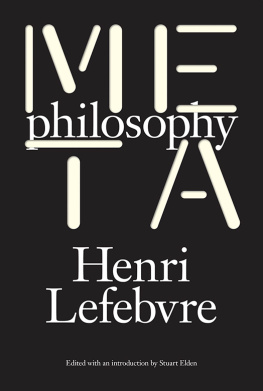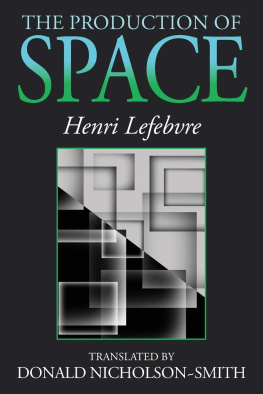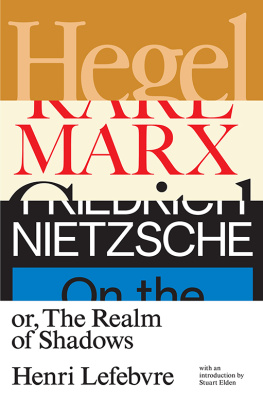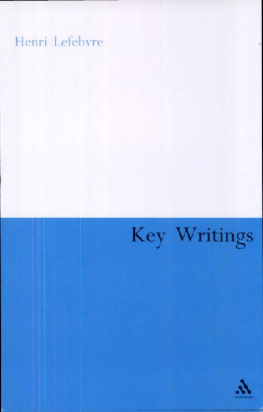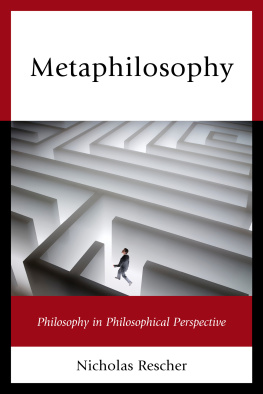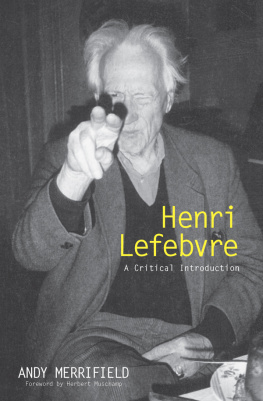Cet ouvrage publi dans le cadre du programme daide la publication bnficie du soutien du Ministrre des Affaires Etrangres et du Service Culturel de lAmbassade de France reprsent aux Etats-Unis. This work received support from the French Ministry of Foreign Affairs and the Cultural Services of the French Embassy in the United States through their publishing assistance programme.
BEFORE 1965: THE PATH TO METAPHILOSOPHY
While he is best known today for his writing on cities, everyday life and the production of space, Henri Lefebvres work covered a vast range of topics. Metaphilosophy, a book he wrote in his sixties but which counts as a mid-career landmark, is an essential part of that story. Lefebvre regularly stated that there were, for him, three key thinkers: Hegel, Marx and Nietzsche. Metaphilosophy clearly demonstrates this threefold debt, but it also brings a number of other figures into the conversation.
In his earliest writings, dating back to the 1920s, Lefebvre was already under the spell of Hegel. He was part of a small group that founded the journal Philosophies, along with Georges Polizer, Norbert Guterman, Georges Friedmann and Pierre Morhange. Their work was partly orientated as a challenge to Henri Bergson, and under the influence of Lon Brunschvicg, whom Lefebvre references a couple of times in this study. They wrote a manifesto of which excerpts were published in the Philosophies journal and then in its successor, Lesprit. This early period had a profound impact on Lefebvres work, especially on analyses of the relation between Marx and Hegel, a major theme of his career.
Opposing the prevailing political atmosphere in Europe, Lefebvre also wrote two stinging critiques of right-wing politics: La nationalisme contre les nations in 1937 and Hitler au pouvoir: les enseignements de cinq annes de fascisme in 1938. This is partly because it was proscribed and burned by the occupying Germans, along with Lefebvres book on Hitler and other early studies.
During the war, Lefebvre left Paris and spent most of his time in the Pyrenees. The exact nature of his involvement with the Resistance is unclear, and it seems he worked more as a theorist and writer than as an active agent. He made use of the time in exile to go through local archives, which later formed the basis for his doctorate on peasant communities in the region.
Immediately after the war, books came thick and fast. Between 1946 and 1958 Lefebvre combined production of introductory works on Marx and Marxism Logique formelle, logique dialectique; Marx 18181883; Pour connatre la pense de Karl Marx; Le marxisme; Pour connatre la pense de Lnine; Problmes actuels du marxisme with a range of other studies. This book, whose radical nature today is easy to overlook, helped to inaugurate what became known as cultural studies.
Though his writings on the subject would not be collected into a book until much later, in the late 1950s Lefebvre also began to engage with the emerging interest in structuralism. The second is that the relation between the diachronic and the synchronic is equally significant: by privileging the latter, structuralism denies history and becoming. The third is that content and form must be examined together in linguistics and semiology: la langue, language, must not take precedence over la parole, speech.
The year 1958 was crucial for Lefebvre: it was the year he was finally expelled from, or left, the PCF: the record is unclear. All this before Metaphilosophy enough of a career for almost anyone, and, while the date of Lefebvres birth is disputed, by 1965 he could have been 60, 64, or even 67. But Lefebvre would go on publishing for another two and a half decades, including many of his most cited works.
PHILOSOPHY BECOMING WORLD: WORLD BECOMING PHILOSOPHICAL
In Metaphilosophy Lefebvre does nothing less than try to work out, in some detail, the implications of Marxs thought for philosophical engagement. Lefebvre continually insists that he is not trying to make Marx into a philosopher, but to suggest that there is a philosophy in his thought.
The nature of Marxs engagement with the world remains to be seen. While the eleventh thesis on Feuerbach is of course well known, Lefebvre was fond of quoting a phrase from the preparatory notes to Marxs doctoral thesis: The worlds becoming philosophical is at the same time philosophys becoming worldly, that its realization is at the same time its loss. To answer this we need to consider both what process is at stake and what is being overcome. Full answers to these questions must be sought in Lefebvres work, and there is no better place to begin than Metaphilosophy.
With regard to the world, this is a book in which the vocabulary of le monde, le mondial, le mondain the world, the worldwide, the worldly and the term mondialisation appear continually. For consistency, especially with the State, Space, World collection, we have tried to keep to world-based words. In English we tend to slip between world and globe very easily, and with all the talk today of globalization it is easy to miss the significance of what is going on here. Lefebvre, together with thinkers associated with the journal Arguments, including Axelos, was developing a new conceptual vocabulary which long pre-dates the English use of these terms. Le mondial the worldwide was not the same as the total, or le global, which in most instances simply means the general. In modern France globalisation and mondialisation are frequently seen as equivalents, or the latter as simply the French translation of the Anglophone word. But for Lefebvre, and even more so for Axelos, it was important to stress the world element. Rather than the ugly worldization, we have left the French term untranslated. For Lefebvre and his colleagues, the process of what we today call globalization is made possible by the grasping of the world as a whole, and the extension of phenomena across it, i.e. mondialisation.
Lefebvre frequently uses the term dpassement here, often as a translation of the German Aufhebung. The terms relate to the verbs dpasser and aufheben. None of these words are straightforward to translate. The German, used by Hegel and developed by Marx, has a well-known range of meanings, including the seemingly contradictory ones of lift up, negate, preserve, and annul. The term is thought to capture dialectical thought and processes, which is why Marx adopted it, even as he turned the process to stand back on its feet. Supersede is a frequently suggested English-language equivalent, and it is used here. Yet as some of the remarks Lefebvre makes here and elsewhere indicate, the French term

